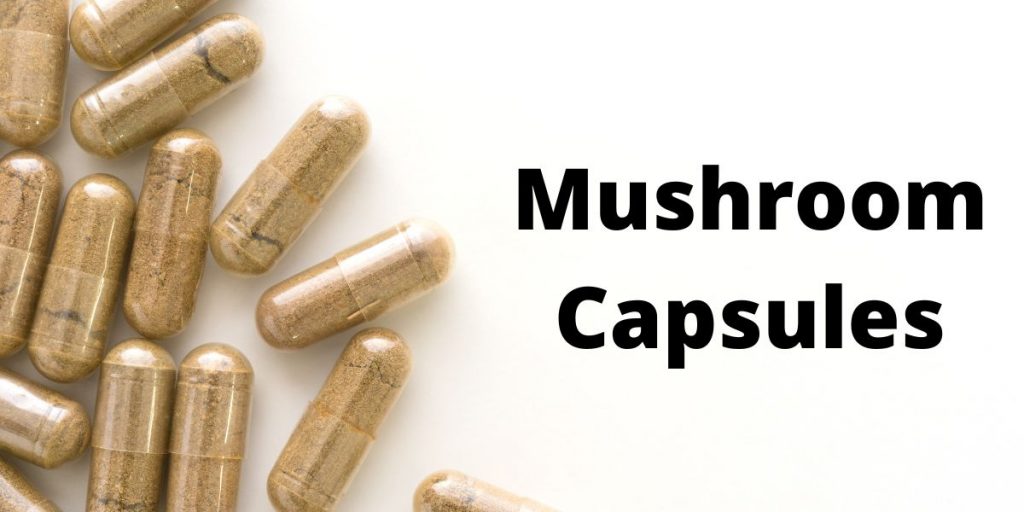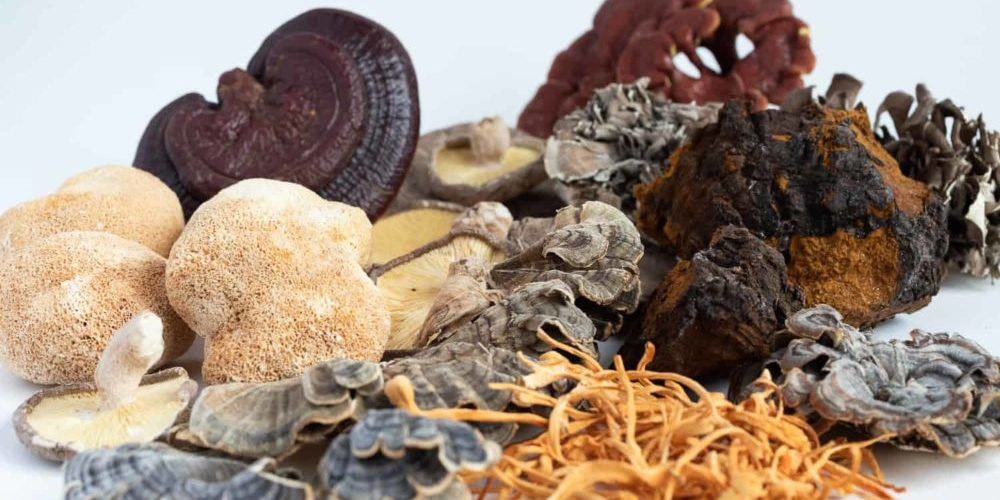Mushroom capsules are what they sound like: gel cap pills filled with mushroom powder or mushroom extract powder. Although you could make magic mushroom pills, that’s a) illegal and b) not what we’re talking about here. We’re talking about medicinal mushrooms. Mushroom capsules are available from many suppliers, or you could make your own.
Maybe you’ve been hearing about people taking mushrooms this way, but you don’t yet have a good handle on what the benefits of mushroom capsules might be or how to get a hold of some yourself. That’s OK. We’re happy to help you come up to speed.
Why Take Mushroom Capsules?
Many mushroom species are either used in traditional herbal medicine or have been shown to have medicinal potential in preliminary studies—or both. Very few have actually been the subject of extensive clinical trials, much of the evidence that supports medicinal mushrooms is anecdotal.
With that being said, many studies haven’t been funded because there isn’t big money to be made by the pharmaceutical companies in Mushroom Supplements.
But why not just eat medicinal mushrooms for dinner? There are two main reasons.
First, many medicinal mushrooms are not palatable. The problem is usually not so much taste as texture—they have a consistency similar to cardboard or even wood. The only way to consume them is as powders, teas, or extracts.
Second, most mushrooms have a relatively low concentration of the chemical constituents thought to confer the actual medical benefit—the rest of the mushroom is water and chitin and other materials that might be enjoyable on the plate but aren’t actually medicine. So if you tried to get a medically-important dose by just eating mushrooms, you’d need to eat huge amounts every day. That might not be healthy, and it certainly would get boring after a bit. So mushroom extracts get around both problems, giving you a less-bulky, more palatable way to get the health benefits you’re looking for.
It’s possible to mix powdered extracts into smoothies or other foods and drinks, but putting them in capsules is convenient and does simplify dosing—instead of measuring out powder yourself, you just take the right number of pills.
Buying Mushroom Capsules
So, how do you get yourself a supply of mushroom capsules? You can make your own. Simply buy or make an extract powder of the kind of mushroom you want to take, buy empty gel capsules of the size you want, and fill the capsules. Or, you can buy capsules ready-made. Of course, not all mushroom capsules are created equal, so if you are going to buy, you’ll need to know what to look for—and what to avoid.
We do need to differentiate between powdered mushroom and powdered mushroom extract. It’s possible to just dry and grind up a whole mushroom to get mushroom powder, and there are circumstances where doing that makes a lot of sense. Drying is one way to preserve mushrooms for long-term storage, and some recipes call for pulverizing dried mushrooms rather than using them whole—puffball powder can be used to thicken soups, for example. You can also pulverize woody mushrooms to make tea. But powdered whole mushroom is still too bulky to be used in pills—you’d have to take a lot of pills to get your medicinal dose! For capsules, you’ll need powdered extract.
The basic procedure for making extract powder is to first make a strong mushroom tea (hot water extract), and then to dry the tea to get a powder. This is a very different product than powdered whole mushroom, and it’s important not to mistake the one for the other. You may in fact find powdered mushroom in capsule form, and product descriptions could make it hard to be sure which is which, so pay attention. If you want capsules, you are looking for powdered extracts.
What to Look For
The most important thing when looking to buy mushroom capsules is to be sure you’re really getting the species you think you’re getting. Sadly, this cannot be assumed; testing has revealed that some brands sell material that is very different from what it is supposed to be. It’s just a matter of doing your research and choosing a reputable brand. But there are a few other markers of quality to look for, too.
You will want hot-water extracts made from fruiting bodies—that is, the mushrooms themselves, not the mycelium that gives rise to the mushrooms. You will also want to pay attention to what the gel capsules are made of. And you really need extracts that give a guaranteed, measured amount of whatever medicinal substance you are looking for, usually Beta-D-Glucan.
To explain why you want all these things, it’s easiest to explain why you want to avoid their opposites.
What to Avoid
Some brands proudly announce that their product is an alcohol extract. These are useless, a fact that may come as a surprise to people used to herbal medicine. Plants can be extracted using hot water, alcohol, or glycerin, and there are advantages to each. But mushrooms aren’t plants. Only hot water can melt the chitin in the cell walls, and without hot water the medicinal substances you’re looking for stay locked behind those walls.
A two-step extraction using both hot water and alcohol may be useful, but without hot water, you won’t get much of an extract.
Some brands are equally proud to announce that their product is a mycelium extract or a “full-spectrum” extract of both mycelium and fruiting body. The problem here is usually not with the mycelium itself, which may sometimes contain medicinally useful substances, depending on the species. The issue is that it’s impossible to separate mycelium from its growth medium, so what you get is not just an extract of the mycelium, but also of whatever it was growing in, usually grain. And you want mushroom, not grain extract, right? Unfortunately, mycelium is a lot quicker and cheaper to produce than fruiting bodies, so some companies cut corners by extracting the mycelium instead.
There may be some exceptions where mixed mycelium-and-fruiting-body extract is what you want, but you can research those out separately. As a general rule, a brand that tries to sell you mycelium extract, with or without fruiting body extract mixed in, is saving a buck at your expense.
For most types of medicinal mushroom, the substance you’re after is Beta-D-Glucan. A reputable company will be able to tell you exactly how much Beta-D-Glucan you’re getting because they test regularly.
Again, if there are any exceptions, mushrooms you want because of other medicinal substances—you can research those separately. But as a general rule, you want a guaranteed amount of Beta-D-Glucan.
Finally, not everybody cares what type of gelatin the capsules are made of, but some people care very much. The cheapest option—the most likely suspect if the company doesn’t specify—is gelatin made from pork or beef. Neither is vegetarian, and neither is kosher or halal. Fortunately, there are several other options, depending on what your needs are, and the brand should tell you what you’re getting so you can make an informed choice.
Medicinal Mushrooms You Can Take in Capsules
Here is a list of some of the medicinal mushroom types commonly sold in capsule form. This is not an exhaustive list, nor is it intended to provide medical advice. For that, you have to consult a qualified practitioner.
Lion’s Mane
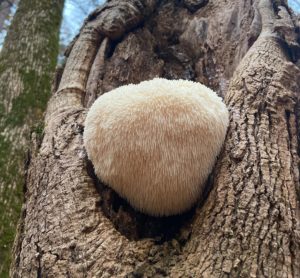
Lion’s mane (Hericium erinaceus) is a culinary mushroom in good standing—it tastes delicious, rather like crab meat. It also is used as a medicinal supplement for neurological issues. Taking this mushroom in extract form, in capsules, is simply a convenient way to get a higher, more regular dose than you’d get by having lion’s mane for dinner.
The other members of the Hericium genus taste the same and are sometimes treated as interchangeable medicinally, but there is no research as to whether they actually are interchangeable medicinally.
In a hurry? Here is the Best Lions Mane Supplement on the Market.
Turkey Tail
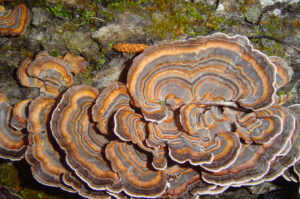
Turkey tail (Trametes versicolor) is used to support the immune system. It is entirely unpalatable, having the texture of cardboard, so extracts are the only way to take them. The fruiting bodies do resemble miniature wild turkey tails.
In a hurry? Here is the Best Turkey Tail Supplement on the Market.
Cordyceps
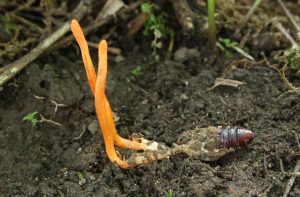
Cordyceps is a genus of predatory fungi that attack and kill insects or, in some species, other fungi. Some Cordyceps species are used medicinally as adaptogens, that is, substances that help the body recover from stress and exhaustion. It’s not entirely clear whether different Cordyceps species have exactly the same effect. They are not used in cooking.
In a hurry? Here is the Best Cordyceps Supplement on the Market.
Chaga
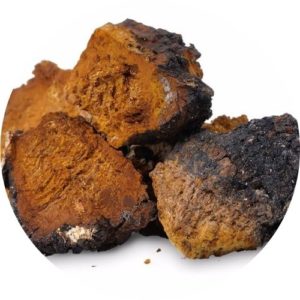
Chaga (Inonotus obliquus) is not exactly a mushroom, but it is a fungus that grows in birch trees and produces an irregular, woody mass. It has a long history of use in folk medicine, and there is some evidence that it might boost the immune system and reduce inflammation.
In a hurry? Here is the Best Chaga Supplement on the Market.
Reishi
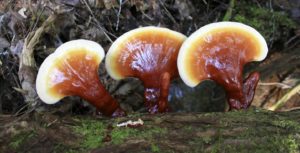
Reishi (Ganoderma lingzhi) has a long history of use in folk medicine for a wide variety of ailments. Modern research suggests that at least some of these uses are effective, although there can also be some health risks associated with taking this fungus (something most writers don’t address). A complication is that reishi belongs to an entire complex of very similar fungi found across Europe and North America that until relatively recently were all thought to be the same thing. Many people still treat them all as if they were the same thing—which may or may not be appropriate medically. Reishi is hard in texture and entire unpalatable except as tea or powdered extract.
In a hurry? Here is the Best Reishi Supplement on the Market.
Maitake
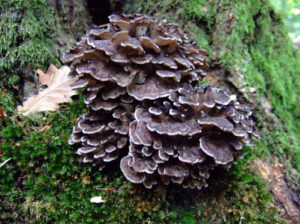
Maitake (Grifola frondosa) is also called hen-of-the-woods (not to be confused with chicken-of-the-woods, a different fungus). It is quite good to eat, especially friend with cheese, and it has been used in traditional folk medicine for diabetes and hypertension.
Agarikon
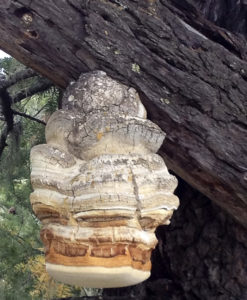
Agarikon (Fomitopsis officinalis) has a long history of use in folk medicine to treat a variety of complaints, including diabetes and lung problems. It is both bitter and woody-textured, making capsules possibly the best way to take it.
In a hurry? Here is the Best Agarikon Supplement on the Market.
The Best Mushroom Capsules
As you can see by our recommendations we believe the best mushroom capsules are made by Noomadic Herbals.
They meet all of the criteria we outlined above.
They are hot water extracted.
They are made of mushroom fruiting bodies.
They measure bio-actives by Beta-D-Glucans.
They do not use mycelium on grain.
They are a trustworthy company, with great online reviews.
If you aren’t looking for a specific mushroom capsule we highly recommend their Mushroom Total which is a combination of the 5 best ‘power mushrooms’ in existence.
In a hurry? Here are the best Mushroom Capsules on the Market.


